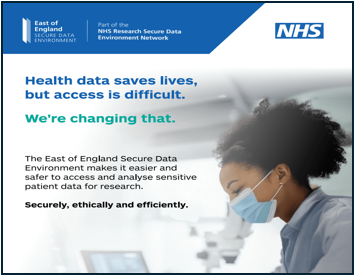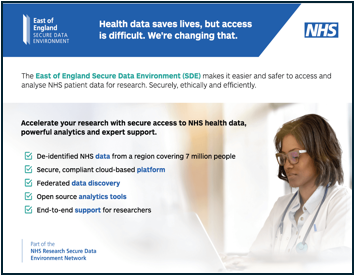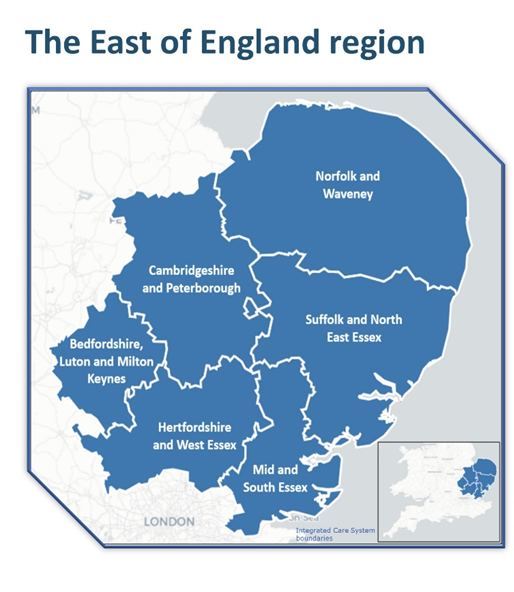For Researchers
About the SDE
The East of England Secure Data Environment (SDE) provides secure access to NHS patient data and a range of services to accelerate research and innovation, leading to improved patient care. It is part of NHS England's Data for Research and Development Programme and is a member of the NHS Research Secure Data Environment Network.
The East of England Secure Data Environment (SDE) is live and operational. We are supporting health and care research using de-identified NHS patient data and are open to project requests, including 'bring your own data' projects that require a secure workspace with data science tooling and computational support.
The SDE is designed to make it easier to undertake health data research. Click on the images below to view our researcher leaflets.


The area
The East of England includes the following regions, with a total population of 7 million people:
- Norfolk and Waveney
- Cambridgeshire and Peterborough
- Suffolk and North East Essex
- Bedfordshire, Luton and Milton Keynes
- Hertfordshire and West Essex
- Mid and South Essex
Requesting access to the East of England SDE
To meet compliance and governance standards, we have a structured data and platform access process. This includes a request for detailed information about your project, the provision of a feasibility and cost proposal, and review by our data access committee.
Please fill in the form below to tell us more about your project. One of our team members will be in touch to discuss your project further.
Before accessing the EoE East of England Secure Data Environment platform, researchers must read and accept the Acceptable Use Policy.
Our Data Services
At the East of England SDE, we are committed to making the UK the best place in the world for data-driven research. Our data, platform infrastructure and services offer significant opportunities to accelerate discoveries that benefit patient and population health.
The information below provides a summary of the services we can provide to researchers. Contact us if you have a specific service need not explicitly identified below - we will be delighted to discuss how we can best support you. We can also discuss the charges for data and platform access.
Key features
- Secure Linux (AWS) Virtual Desktop Infrastructure on a cloud-based platform
- Provision of published datasets
- Provide tooling and computational support for Bring your own Data projects available on request
- Unpublished/custom datasets available on request
- Python and R (using JupyterLab development environment), plus other tools available
Platform services
A secure workspace standard package, including cloud-based Linux Virtual Desktops providing access to an instance of the platform, a suite of included tools, and support capabilities, will be implemented for each project.
Technical summary
- Secure Linux (AWS) Virtual Desktops.
- Flexible compute options to suit your needs, including Standard with 16GB RAM and 4 vCPUs.
- Only pay for what you use.
Included tools
- JupyterLab development environment
- Python
- R
- LibreOffice
- Airlock - for data or code egress
- PostgreSQL
Optional tools
Other tools available include the following, although note these may include additional service charges:
- DBeaver (cross-platform SQL database editor and IDE)
- Git import capability
- Bring Your Own tool: users can request access to their own tool(s) to use for analysis purposes within the secure workspace (subject to technical and security review)
- Bring your own code: users can request access to their own code to be used within the secure workspace (subject to technical and security review)
- Secure workspace decommissioning and removal
- Computing power increase/decrease: flexible compute power to suit your needs configurable for each workspace and session
Consultancy services
We offer a range of consultancy services to support data research projects. These include:
- Data access application support
- Feasibility assessment - including but not limited to data provenance summaries (origin, mode of collection, original purpose, for example)
- Project management
- Contracting and legal support
Data
We are able to provide curated datasets from participating health and care providers in secondary care settings across the East of England. We are aiming to achieve a harmonised data model (OMOP Common Data Model) across participating secondary care providers by summer 2025 to support data and cohort discovery.
Classes of data available currently include:
- demographics
- secondary care - events, diagnostic and procedure coding, lab results and prescribing
In addition to curated datasets, we also offer:
- a refresh/update of a published dataset
- to provide a synthetic dataset
A full list of available datasets is published on the HDR UK Health Data Gateway.
Contact details
If you’re interested in learning more about how the East of England SDE can solve your data challenges, email our team and tell us about your requirements. We can then schedule a call and provide further details. We're looking forward to supporting your research.
- Email the team at cuh.eoe.sde@nhs.net
Applying for data through the SDE
If you are interested in applying to access data through the East of England SDE, please email the team at cuh.eoe.sde@nhs.net to discuss your project requirements and timelines. They will provide you with a Data Access Request form and information about any other requirements that need to be completed in advance of project review.
Review by the Data Access Committee
All applications to use the East of England SDE are reviewed by the Data Access Committee (DAC), which includes data governance and legal experts, representatives from organisations providing data and members of the public from across the East of England. The DAC use the information that you provide on the form to determine whether the proposed project is in line with the '5 Safes' criteria and is in the public interest.
Members of the SDE team will conduct an initial review of the information you provide and may request additional information, clarification or revision of information provided before a DAC date is assigned. This allows sufficient time for meeting materials to be created and circulated for the DAC members to review in advance of the meeting, and increases the chances that a decision can be made about your project in a single meeting.
Dates for upcoming DAC meetings are shown in the right hand column below, along with the cutoff dates for receipt of an adequately completed DAR form that has been assessed as being suitable for review by the SDE team.
Where researchers are aiming for a review on a specific listed date, they should discuss this with the SDE team as early as possible and ensure that they respond to all outstanding queries by the cutoff dates shown in the left most column.
DAC meeting dates 2025/2026
| DAR submission deadline | Meeting pack sent to DAC members | DAC date |
|---|---|---|
| 5th September 2025 | 19th September 2025 | 26th September 2025 |
| 3rd October 2025 | 17th October 2025 | 24th October 2025 |
| 7th November 2025 | 21st November 2025 | 28th November 2025 |
| 2nd January 2026 | 16th January 2026 | 23rd January 2026 |
| 6th February 2026 | 20th February 2026 | 27th February 2026 |
| 6th March 2026 | 20th March 2026 | 27th March 2026 |
| 3rd April 2026 | 17th April 2026 | 24th April 2026 |
| 1st May 2026 | 15th May 2026 | 22nd May 2026 |
| 5th June 2026 | 19th June 2026 | 26th June 2026 |
| 3rd July 2026 | 17th July 2026 | 24th July 2026 |
| 7th August 2026 | 21st August 2026 | 28th August 2026 |
